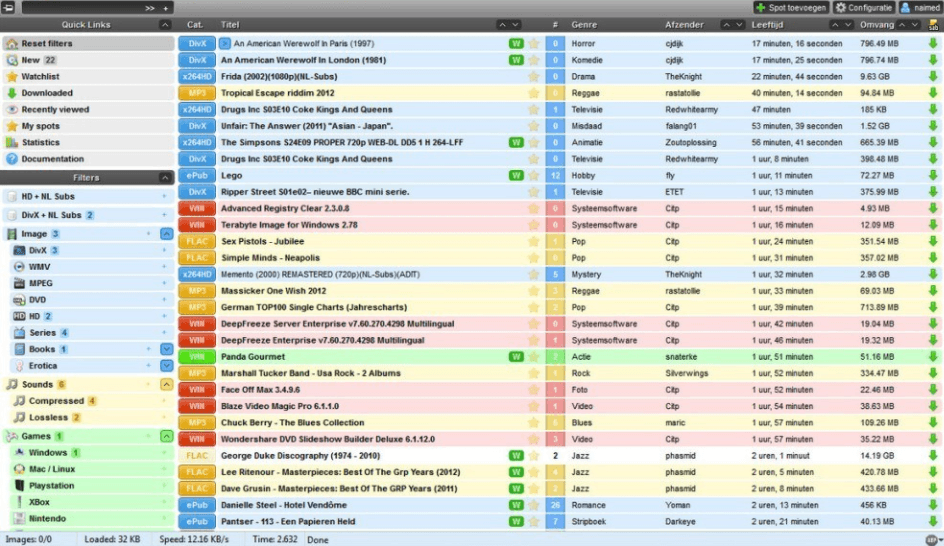While most pirates in 2020 use torrent, streaming and download portals for their general piracy needs, many are still obtaining the latest content from Usenet, one of the oldest file-sharing systems around.
With masses of storage space and blisteringly quick download speeds available (not to mention archives dating back years), Usenet is still a significant source of pirated movies, music, games and just about every other type of content available. But finding that content isn’t always so easy.
Finding Content on Usenet
Since Usenet isn’t web-based, methods have been created over the years to enable people to download more easily from the newsgroups. The NZB file, for example, can be described as a kind of .torrent file for Usenet, one that is quickly downloaded and contains ‘directions’ so that clients can access content.
Sites for downloading NZB files still exist but aren’t as prevalent as they once were, so finding the whereabouts of content on Usenet is still something pirates have to achieve. In 2001, almost two decades ago, Netherlands-based Usenet community FTD launched with a goal of helping people do just that.
After Legal Action, FTD Shuts Down
After around eight years in operation, the FTD community had grown to 500,000 members and with the assistance of its own software, was enabling users to find (‘spot’) the location of material they found on Usenet and share that information with others. This community effort enabled huge numbers of people to find and download all the content they wanted but with much of it infringing, Dutch anti-piracy group BREIN became involved.
Ultimately, a court found that FTD acted outside the law and in 2011 it was ordered to remove all ‘spots’ of copyrighted files within a month. At the time BREIN said that people weren’t allowed to structurally make use of illegal files, and that applied to Usenet as well as the wider Internet.
“BREIN will also hold liable any other websites and services that do the same regardless of the technical protocol they use for their illegal business model,” BREIN chief Tim Kuik said at the time.
As it turns out, nine years after the takedown of FTD, BREIN says it is still doing just that.
Spotweb – A Web Client/Interface for the Spotnet Protocol
Following the demise of FTD, a protocol known as Spotnet gained an unexpected boost. Operating on top of Usenet, Spotnet provides an alternative to Usenet indexing sites, making ‘spots’ less vulnerable to the anti-piracy actions of groups like BREIN. In order to see content ‘spots’ a Spotnet client is required. However, people can also make use of Spotweb, a piece of software that as its name suggests, brings ‘spots’ directly to the web.
“Spotweb is open source software that allows you to locate illegal copies of entertainment content in newsgroups on usenet. You can set up Spotweb so that it is visible to everyone. It then acts as a website,” Dutch anti-piracy group BREIN said in an announcement this week.
While BREIN is interested in all types of piracy related to Usenet, Spotweb’s ability to make content extremely easy to find via the web is clearly an issue, as the screenshot of a Spotweb instance below shows.
Spotweb is available on Github and can be installed on Unix-based systems and even NAS devices from companies such as Synology and QNAP. As such the barrier to running a public repository of infringing content links is quite low, something that BREIN is keen to discourage.
BREIN Says it is Taking Action Against Those Running Spotweb
“People who do this offer illegal spots (nzb links or references) to unauthorized content. BREIN writes to such providers and urges them to stop doing so, to sign a declaration of abstention with a penalty of 500 euros and to pay 150 euros in costs,” BREIN said this week.
Speaking with TorrentFreak, BREIN chief Tim Kuik said that Spotnet/Spotweb has become one of the main means to search for and download pirated content from Usenet and those running it for infringing purposes face a situation as precarious as that faced by FTD all those years ago.
“The legal position is the same as for FTD and other link sites. Linking to illegal content is illegal and has been standing case law [in the Netherlands] for well over a decade. It started out being a tort and in the meantime, under EU case law, it is now a communication to the public,” he explained.
As is common with ongoing actions for shutdown and settlement, Kuik didn’t provide specifics on who had been approached to shut down, who had shut down, or how many people had agreed to pay settlements. However, he confirmed that during the past few weeks, “a handful” of people operating Spotweb sites had been approached by the anti-piracy group with orders to close.








